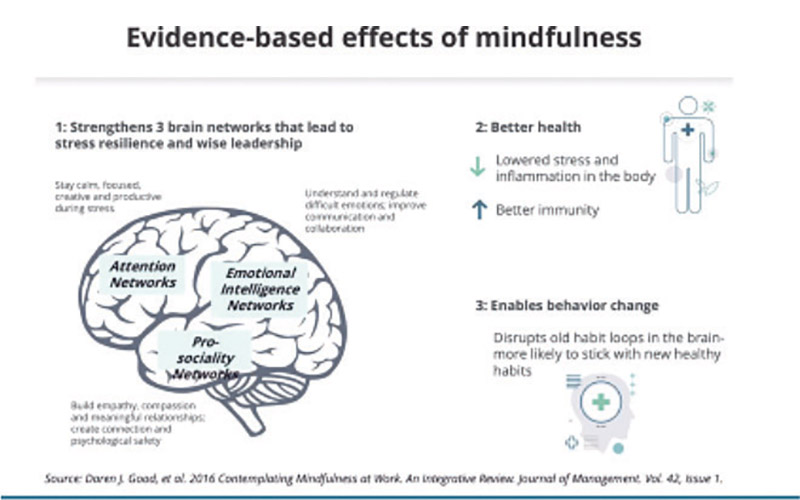Evidence-based effects of mindfulness by strengthening your brain. Courtsey Photo
Resilience is explained as the capacity to respond to pressures and tragedies quickly, adaptively, and effectively and develop new learning and growth.
The aim is to not just bounce back from a situation but to bounce back better.
Our lives consist of resources and demands. Resources include intelligence, sleep, co-worker support, and emotional awareness to name a few. Our demands can consist of lack of support from co-workers, lack of support from home life, and feeling overwhelmed.
The art of mindfulness can help build resilience.
Studies have shown that unfortunately our family, friends and work family can play a role on both sides of this equation. As team members your team may be your resource but may also be your demands.
Farming is stressful. There are so many variables but adding to that, is a lot of the time you are dealing with immediate family members, and possibly employees added to the mix.
We all have those occasions where someone says something to us that we don’t like, or a work colleague is rude or abrupt and it is up to each of us to think carefully how to respond.
Your response will affect you and your health.
Parneet Pal, MBBS, MS of Wisdom Labs discusses the effects of mindfulness. Studies have proven that whatever we practice becomes stronger. If we practice being calm and thinking before we react, our minds will become stronger in being able to react less aggressively and more compassionately. On the other hand, if you allow the quick, hot-headed aggressive reaction to be your dominant reaction then your brain will focus and increase those responses.
It is the quick negative responses that increase the negative impact on your own physical and mental health.
It has been proven that people who are more in tune with the negative quick reactions are more likely to develop chronic diseases that will have long lasting impacts on their health and well-being. In excess of 80 percent of chronic diseases have shown the root cause as stress.
Stress is your body reacting to one or more of your survival needs not being met. This can be subconsious. Your mind is already warning you before you are even aware that there may be something out of line.
The three survivor needs are safety (fear), reward (frustration) and connection (isolation).
When your brain detects possible threats your initial reaction is either flight or fight.
Think of your well-being. Take that extra moment the next time you are sitting in a meeting, working in the fields or even responding to a family member.
Before you respond, take a deep breath, become aware of where you are and what you are about to respond, allow yourself to think before you react and see if you can build your mind to respond in a more positive and less assertive manner.
You may even find that by trying to relate to the other person or situation you may not need to respond at all but at the least, if you do need to respond and it is negative, you can control the impact the situation has on you and the other person and yourself.
Mindfulness builds resilience. The bottom line is you can control your reaction to every situation. You are in control of how you react and how you make others feel in every situation. Is this easy? No way! It takes practice and the will to want to improve your reactions to situations and the desire to be resilient.
Resilience is a skill using neuroplasticity during stressful events. Resilience can mean offering a stronger, more open-minded positive mindset.
As we enter into the hectic fall season and the stress is compounded by the demands of timely harvesting, quality feed and overall wrap up of another year of farming I encourage you to take on the challenge of being mindful and build your resilience – it is for your best interest.










